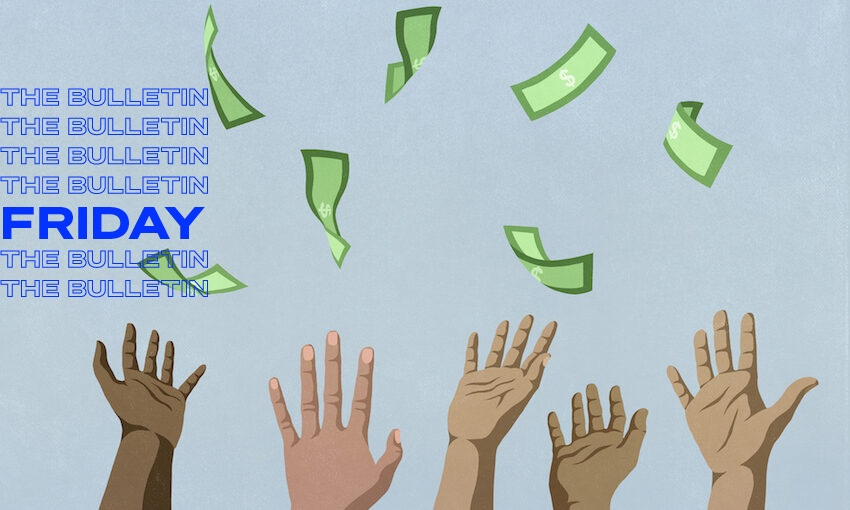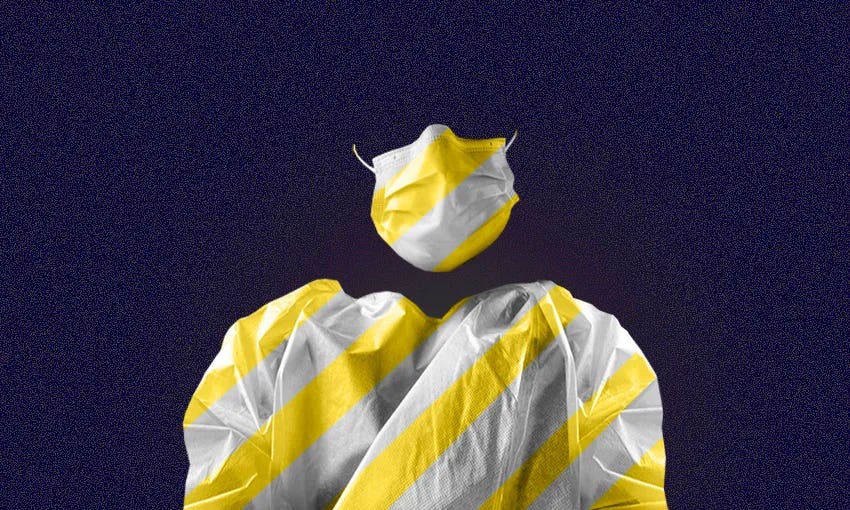Is it time to ask your boss for a pay rise?
With inflation at a three decade high, New Zealanders face another year of shrinking paycheques as costs soar
Mōrena and welcome to The Bulletin for Friday, January 28, by Justin Giovannetti. Presented in partnership with Z Energy.
In today’s edition: Schools to reopen despite omicron; National climbs in new poll; Top has a new leader; but first, how to deal with out-of-control inflation.
With high inflation expected to stick around, it’s time to ask for a raise. (Getty Images)
Inflation is soaring around the world and NZ hasn’t been spared. Domestic prices are growing at the fastest rate in a generation, with inflation hitting a 31-year high of 5.9% at the end of 2021. As Hamish Rutherford writes in the NZ Herald (paywalled), the last time inflation was this high “the Reserve Bank was given new powers to use interest rates to keep prices stable”. Much of New Zealand’s recent prosperity grew in that predictable environment. Too much inflation is bad for an economy, it often means that basics become more unaffordable and families struggle to budget when prices are rising fast. It’s hard to shop wisely when you don’t know what a good price is anymore.
This problem isn’t going away soon. Predictions set last year that this unexpected bout of inflation would be a temporary blip caused by Covid-19’s wrecking ball on supply chains have been dashed. Experts are now predicting another year of fast increasing prices, with inflation continuing at high levels into 2023. According to One News, the prime minister said after the StatsNZ figures were released that global pressures, like a 30% surge in petrol prices, were behind the inflation increase. Some of that is true and inflation is not a partisan issue, it would be happening regardless of who is in the Beehive, but there’s a local dimension to the problem.
Non-tradable inflation was way up. Economist Brad Olsen told The Bulletin that there are some troubling indicators in the data. One of them is non-tradable inflation, which is a measure that only looks at the increase in prices of things we don’t get overseas.
“Diving into the numbers deeper, you get a sense that there is some international stuff at play, but 5.3% in non-tradable inflation isn’t stuff we are importing, that’s demand exceeding supply here”, said Olsen.
That far exceeded expectations and is the highest level on record. House prices, rental hikes and the cost of some local materials are increasing prices across the economy. The increasing cost of nearly all our imports, from face masks to PlayStations, has made the problem worse.
While the roots of inflation aren’t partisan, this will quickly become a political problem for Labour, Henry Cooke writes for Stuff, because it’ll hit hardest the people the government says it wants to help.
So what does this mean for you? About half of New Zealand workers didn’t receive a pay rise last year, and for those who did, the average was around 2.5%. That still equates to a 2.4% pay cut. As RNZ explain, this won’t be a surprise for many readers who are struggling. The vast majority of workers enter 2022 worse off, with their weekly pay buying less than it did a year ago. Does that mean you should go to your boss and ask for a 5.9% raise? “In an ideal world, yes”, said Olsen.
Profits across the economy have been rising quickly over the past few years, pay packets haven’t increased much and labour shortages are being reported across the country. It’s a perfect storm for workers to flex their muscles. Profitable businesses face two options: Share the wealth or lose workers.
“Indicators of the labour market are telling us it’s difficult to find labour, there’s more poaching and turnover. What you might see is that if workers hold more power, they can go to their employers and tell them to make it worth their while to stay. If they don’t pony up the cash, they can lose their employees and it’ll be hard to fill their orders, because they can’t replace those workers,” said Olsen.
Omicron means that, yet again, we at The Spinoff will be devoting significant resources to covering this enormous and complex story. If you value what we do, please consider becoming a member today. Every dollar donated is ring-fenced to support our journalism, and right now we need audience support more than ever.
Is your organisation keen to support The Spinoff? We would love to hear from you—contact us today to find out more about our organisation memberships.
PM adamant schools will reopen on time despite omicron outbreak. A series of experts have told the government that the mental health of kids outweighs any risk from the pandemic, One News reports. There might be local closures in the coming months because of teacher shortages (as case numbers soar outside of classrooms), but a body of international evidence shows that closing schools to curb infections is damaging to children. Transmission within schools is very limited. Writing in The Conversation, Jin Russell explains why schools need to remain open to avoid emotional and educational hurt. Vaccinating your kids is the best way to keep them safe.
The Spinoff’s Covid data tracker has the latest figures.
Christopher Luxon and National on the rise in the first poll of the year. Labour faces a long race to the 2023 election that will likely be closer than they’d like, with One News’ poll yesterday showing the governing party’s support falling to 40%. The number of people who prefer Jacinda Ardern as PM has fallen to its lowest level since 2017. Much of the support that flowed to Act and David Seymour last year has now returned to National and Luxon, who are firmly in second place and growing at 32%. The Greens, despite being relatively invisible in recent months, have remained solid at 9% support. As Stuff reports, Labour and the Greens would be able to govern together under these results.
Top appoints former Christchurch councillor as new leader. Raf Manji, an experienced local politician who spent two terms on Christchurch council, is the new leader of the minor party. Manji told Alex Braae, a friend of The Bulletin, that he’s confident the party can secure the support of “political orphans” in the next election with a programme focused on the future. As you can expect from Top, there are a lot of transformative ideas around housing and incomes. Manji now lives in Wellington and could contest the deputy prime minister’s seat, which would be a heroic stand by the new party leader.
Christchurch’s new central city stadium has been given a fresh name. The Press reports that the $533-million stadium will be called Te Kaha. Gifted by Ngāi Tūāhuriri, the name means “the strength”. It’s an improvement over the stadium’s previous moniker: the Canterbury multi-use arena. A commercial naming deal is still possible in the future, that would either go with the name or replace it. Council is expected to approve a final budget for the project in June or July.
Number of house sales over $1 million soared by 70% last year. The unprecedented increase in housing prices means that nearly 35% of all houses sold last year were over the $1 million mark, Stuff reports. A year earlier it was just 21% of sales. If Auckland is excluded, sales of millionaire homes increased nearly 117% last year. In the Manawatu and Whanganui, the increase was over 300%. The conclusion is that the unaffordability of New Zealand houses is no longer a phenomenon in the big cities, but across the country’s regions.
Meanwhile, the number of families looking for financial support to buy school uniforms increased by 50% last year. A children’s charity told RNZ that many families can no longer afford the uniforms as prices have climbed quickly. Families across New Zealand now need to choose between food and uniforms.
Got some feedback about The Bulletin, or anything in the news?
Get in touch with me at thebulletin@thespinoff.co.nz
Right now on The Spinoff: Thomas Lumley digs into modelling suggesting 50,000 daily omicron infections by Waitangi weekend. Toby Manhire looks into what NZ can learn from Queensland’s outbreak. Alex Casey explores a stinky element of Benedict Cumberbatch’s love story for NZ. Justin Latif considers the field running to be Auckland’s new mayor. Bella Duncan and Simone Giovanardi show why a green Antarctica wouldn’t be a good thing for humanity.
Six Nations head says Springboks won’t move north, but… It might be only a matter of time before the South Africans start looking for new places to play rugby after a year of big changes to the game. South Africa’s Stormers, Bulls, Lions and Sharks have quit a rebranded Super Rugby Pacific and joined Europe’s United Rugby Championship. As One News reports, the current annual series for northern hemisphere countries says South Africa isn’t likely to join Six Nations, but how long can the Springboks stay in the southern hemisphere competition when all its major teams look north for play? Don't forget that the All Blacks and Wallabies got thrashed by northern teams last year.






